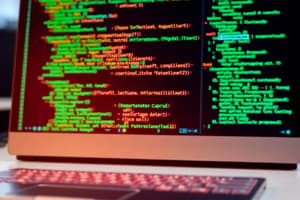Podcast
Questions and Answers
What is Computer Science primarily concerned with?
What is Computer Science primarily concerned with?
- Analyzing data structures
- Studying computer systems, algorithms, and programming (correct)
- Creating hardware components
- Developing mobile applications
What is the main goal of learning Introduction to Programming in 1st PUC?
What is the main goal of learning Introduction to Programming in 1st PUC?
- To understand data mining and cybersecurity
- To specialize in artificial intelligence
- To gain a foundation in computer programming (correct)
- To become proficient in hardware engineering
Which type of programming language is typically recommended for beginners?
Which type of programming language is typically recommended for beginners?
- Machine language
- High-level programming language (correct)
- Low-level programming language
- Assembly language
What aspect of computers will students explore in the 1st PUC program?
What aspect of computers will students explore in the 1st PUC program?
What are the foundational topics that Introduction to Programming will lay the groundwork for?
What are the foundational topics that Introduction to Programming will lay the groundwork for?
Which programming language is widely used in enterprise applications and mobile applications?
Which programming language is widely used in enterprise applications and mobile applications?
What type of programming language is Python known to be?
What type of programming language is Python known to be?
What are variables used for in programming?
What are variables used for in programming?
Which programming paradigm is focused on using pure functions without side effects?
Which programming paradigm is focused on using pure functions without side effects?
What is the purpose of projects and assignments in the 1st PUC program?
What is the purpose of projects and assignments in the 1st PUC program?
Study Notes
Computer Science 1st PUC: A Journey into Introduction to Programming
Welcome, curious learners, to the captivating world of Computer Science as you delve into the fascinating subtopic of Introduction to Programming during your 1st PUC (Pre-University Course) journey. This article aims to provide a detailed, fact-rich exploration of this topic, helping you gain a solid foundation in computer programming to propel you towards a bright future in the realm of computing.
Introduction to Computer Science and Programming
Computer Science is the study of computer systems, algorithms, and programming that enable us to create software to solve problems or achieve specific goals. As a student of Computer Science, you will explore how computers work, how data is stored, and how we can manipulate that data using programming languages.
In the 1st PUC program, you will begin with an introduction to programming, where you will learn the basics of programming languages, data structures, and algorithms. This will lay the groundwork for more advanced topics, such as artificial intelligence, data mining, and cybersecurity, in the years to come.
The First Steps: Introduction to Programming Languages
As a beginner, you will most likely start with a high-level programming language, such as Python, Java, or C++. These languages are easy to learn and are widely used in the industry.
-
Python: Python is a beginner-friendly, high-level programming language known for its simplicity and readability. It is a versatile language with applications in web development, artificial intelligence, and data science.
-
Java: Java is an object-oriented programming language that allows you to write portable, platform-independent code. It is widely used in enterprise applications, web development, and mobile applications.
-
C++: C++ is a powerful and efficient programming language that provides low-level access to the underlying hardware. It is commonly used for system programming, game development, and embedded systems.
The Fundamentals of Programming
As you dive into the world of programming, you will learn about the fundamentals of programming, such as:
-
Variables: Variables are used to store data and values that can be manipulated in a program.
-
Loops: Loops are used to execute a block of code repeatedly.
-
Conditional statements: Conditional statements are used to execute different blocks of code based on conditions.
-
Functions: Functions are reusable blocks of code that can be called from different parts of a program.
-
Data structures: Data structures are used to organize and manipulate data efficiently.
-
Algorithms: Algorithms are a series of well-defined steps used to solve a problem or perform a specific task.
Exploring Different Programming Paradigms
As you advance through the 1st PUC program, you will be introduced to different programming paradigms, such as:
-
Procedural programming: Procedural programming is focused on writing functions and procedures to solve problems.
-
Object-oriented programming: Object-oriented programming is focused on creating objects, classes, and methods to represent real-world entities and their interactions.
-
Functional programming: Functional programming is focused on using pure functions that do not have side effects and are free of mutable data.
Putting it All Together: Practice and Projects
As the 1st PUC program progresses, you will have the opportunity to apply the concepts you've learned in practical settings through projects and assignments. These projects will help you develop problem-solving skills, critical thinking, and collaboration skills.
Conclusion
The introduction to programming in the 1st PUC Computer Science curriculum is a vital stepping stone towards a successful career in the computing industry. By mastering the fundamentals of programming and exploring various programming paradigms, you will gain the knowledge and skills necessary to create innovative software solutions that make a positive impact on society.
As you embark on this exciting journey, remember to be persistent, ask questions, and never lose your passion for learning. Happy coding!
Studying That Suits You
Use AI to generate personalized quizzes and flashcards to suit your learning preferences.
Description
Explore the foundational concepts of programming languages, data structures, algorithms, and different programming paradigms in the 1st PUC (Pre-University Course) Computer Science curriculum. Gain a solid understanding of Python, Java, C++, variables, loops, conditional statements, functions, data structures, and practical application through projects and assignments.




